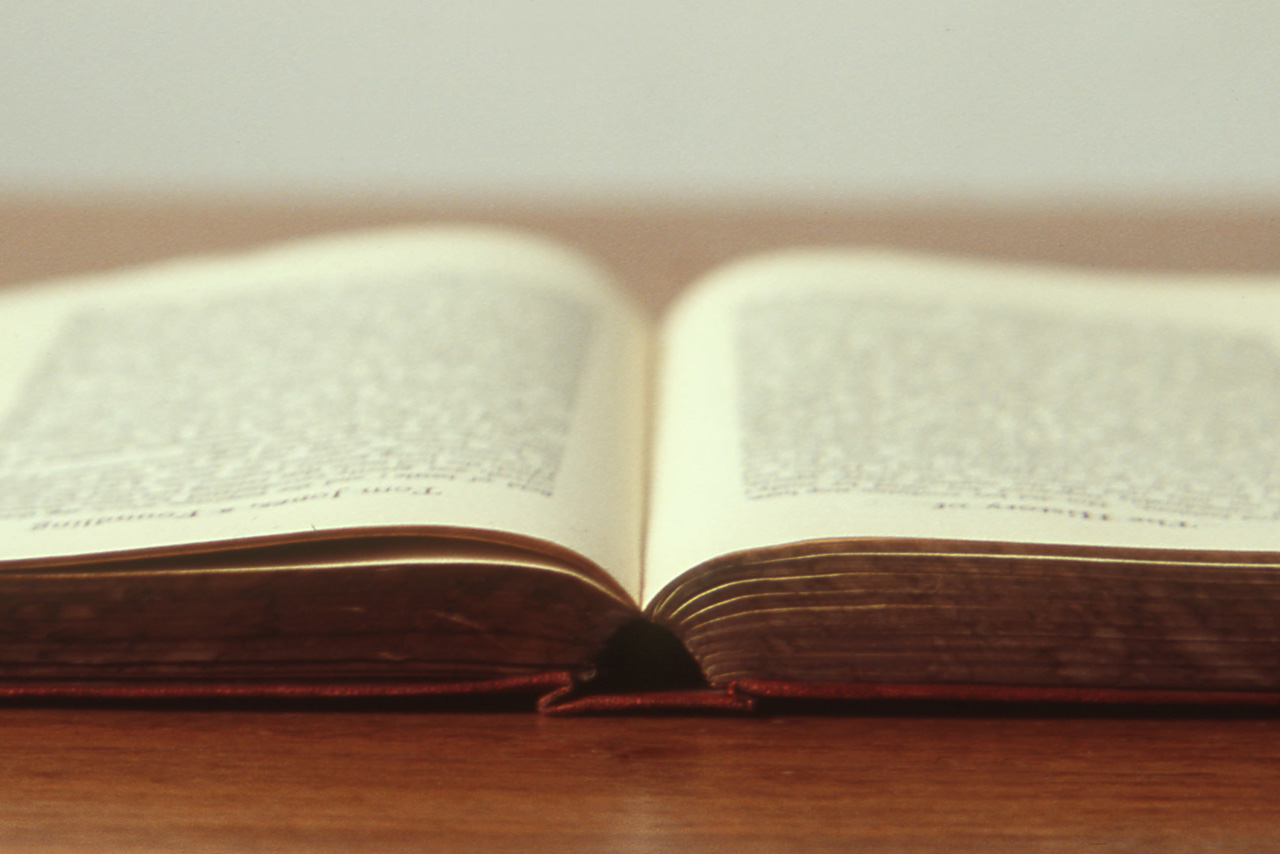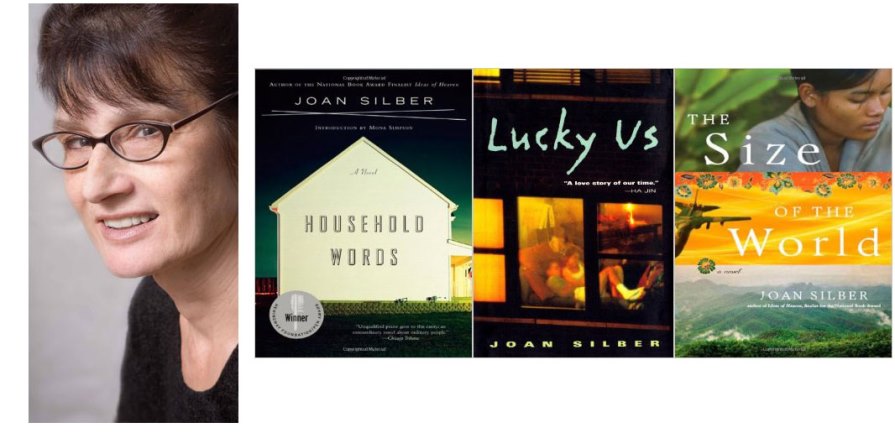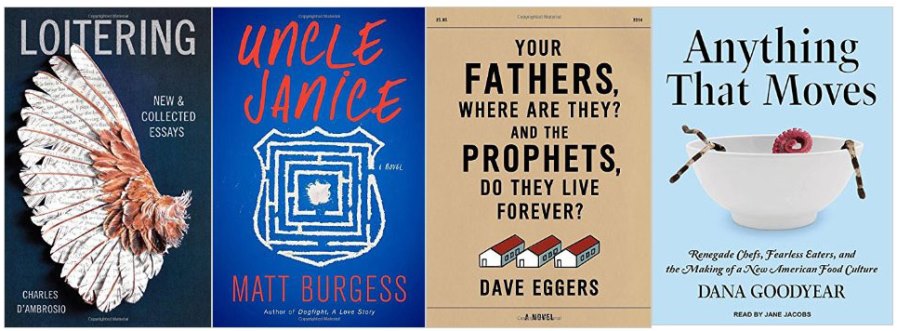Bookish: No Apologies
Our books columnist is back from a year-end slog and reading up a blue streak: essays by Dana Goodyear and Charles D'Ambrosio, new novels by Dave Eggers and Matt Burgess, plus a slew of books by Joan Silber.

2014 ended as a real slog for me, at least in terms of my reading life. Through some combination of choosing the wrong things at the wrong time or beginning worthwhile books I just couldn’t give the proper amount of attention (Marlon James’s fascinating behemoth novel, A Brief History of Seven Killings), and the persistent and easy distraction of magazines, I could feel the wheels just spinning. Lack of time had much to do with it — all those mandatory holiday events with family and friends and school-aged children. (I’m sure my habit of “a few quick hands of blackjack” on the phone didn’t help. The house, or iPhone, nearly always wins.)
What I’m saying is most of that year-end slog was my own doing — I can admit that much. And so, it has been a great surprise to begin this new year with a streak of reading that came to me as many good things do: not due to some seasonal resolution or newfound resolve, but thanks to serendipity. I happened upon the right writers to spend time with and found the groove. I’m a great fan of binge reading, either by topic or by author; I consider a “binge” to be anything more than two related books in a row. Such a thing doesn’t come my way often. I can think of a slew of writers whose writing I love, but who I do not or simply cannot read in this manner: John McPhee, Alice Munro, George Pelecanos and M.F.K Fisher all come to mind immediately. These sorts of authors occupy terrain that is either too vastly different or too similar from book to book for me to consume in a gulp. I want to read all of their works — but not continuously.
But then there are people like Michael Ondaatje, Shirley Hazzard and Denis Johnson — all writers whose work I have, at various times, gorged myself on. I can’t pinpoint anything in particular they have in common that might explain why this is so. They each have a great command of language and consistently impressive if stylistically varied work. But I suspect it’s simpler than all that: these writers just tell stories I can’t get enough of. Now I can add another name to my binge-worthy list: Joan Silber. I’ve read her before with admiration. She is not at all an unknown; she’s been a finalist for the National Book Award. Yet, for some reason, she seems to remain one of those solidly respected writers who live on or just outside the edge of mainstream readership.

Just recently, I cruised through her novels Lucky Us, The Size of the World, and Household Words. All three are good (or better), but the best of them is The Size of the World. Her storytelling skills are many and varied: she interweaves narratives and characters, shifting time periods and voice with ease. Nothing feels gimmicky. Silber both entertains and prompts serious questions. Yet her greatest gift may be her ability to narrate both women and men in equal measure. It’s a tough task for any writer work from the point of view of the opposite sex. More often than not, the effort fails somehow. But reading Silber’s books, I have never once been jarred from the page with the thought,“This is the voice of a man spoken by a woman trying to think like a man might.” What’s more, her twenty-somethings and octogenarians are all equally compelling in their own, believable ways. Silber is just intimately aware of how humans — all kinds of humans — think and feel.
I have a feeling the impulse to burn through a writer’s entire body of work in quick succession comes from the same place as the desire to revisit a restaurant day after day. Everything is done right: the atmosphere, service and food are all exactly as they should be. Reading Silber feels just the same. I hope more readers find their way to her work.
I may have finished up 2014 poking about here and there more than I should have, but that’s not to say I didn’t read quite a lot of excellent stuff. I won’t hit you over the head with the complete list, but I’ll give a few – there are too many good new books published all the time not to send you off with a handful.

Charles D’Ambrosio’s Loitering made a lasting impression on me in every way. His essays had me by turns laughing and physically ill. The man can hit high and low notes like the best of trumpet players; the interplay of the two is what makes his writing masterful.
Of all the books I read, Dave Eggers’s novel, Your Fathers, Where Are They? And the Prophets, Do They Live Forever?, was the one that grabbed and held on tight, from start to finish. There is a whole cult of people who love to hate Eggers, and I won’t try to convert any of them here. Go ahead, hate his needlessly long titles; hate his fame. But I bet if they were to read it jacket-less and nameless, a huge percentage of readers would love this book. It’s not a huge accomplishment to finish the whole story in one sitting; it’s short and heavy in dialogue. And it is damn good.
The most entertaining novel I’ve read in recent months is Uncle Janice by Matt Burgess. This got genuine laughs out loud, almost by the page. What he’s doing, in this second novel, amounts to a love song to Queens, NY, to its tribe and its language.
Dana Goodyear’s collection of food essays, Anything That Moves, manages to go far above and beyond much of what’s become of the genre. There’s none of the usual foodie machismo, and no preaching — though she does mention the words “local” and “sustainable”. She’s a writer whose new essays I always seek out out; they’re great passports for armchair traveling.
Finally, I must call your attention to an article: Bill Hader’s recent “By the Book” feature in the New York Times. It’s always fun to get a glimpse into a notable person’s mind and reading interests, but this column especially struck a chord. Specifically, he makes two observations I found to be important even if, at first, they seem rather pedestrian. He says that he enjoys reading classics, probably because he didn’t attend college. That’s probably meant tongue-in-cheek, but there’s a real nugget of truth behind the joke. We all probably have a list in our heads of books we feel like we should have read — books that feel like required reading if we want to seem literate and relevant. That list is a fluid thing, and none of us have all the boxes checked off. Hader also talks a bit about literary guilty pleasures: he says he doesn’t believe in them, that liking something should never be cause for guilt. Considering how frequently people shame themselves for what they have and have not read, his point seems well worth remembering.
So, here’s to a new year of reading without shame — and, I hope, some Joan Silber.
Hans Weyandt has worked at four independent bookstores In St. Paul/Minneapolis over the past 15 years. He is the former co-owner of Micawber’s Books and the editor of Read This! published by Coffee House Press. He currently works at Sea Salt Eatery, Moon Palace Books and Big Bell Ice Cream.